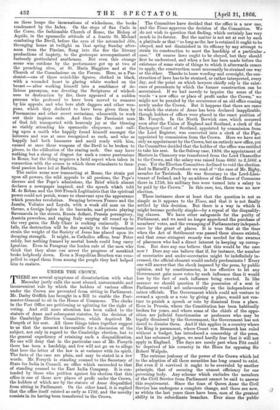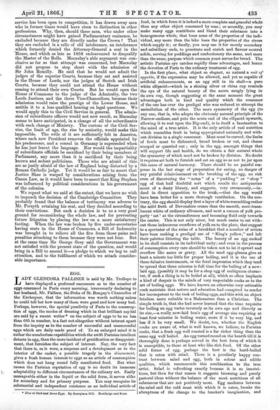UNDER THE CROWN.
THERE are several symptoms of dissatisfaction with what Macaulay justly calls the most absurd, unreasonable, and inconvenient rule by which the holders of various offices under the Crown are prevented from sitting in Parliament. Mr. Darby Griffith has brought in a Bill to enable the Post- master-General to sit in the House of Commons. The clerks in the Post Office are petitioning or agitating for the right of voting. And still more attention has been called to the statute of Anne and subsequent statutes, by the decision of the Cambridge Election Committee, which deprived Mr. Forsyth of his seat. All these things taken together suggest to us that the moment is favourable for a discussion of the subject, not only in regard to the Cambridge election, but to the general expediency of retaining such a disqualification. No one will deny that in the particular case of Mr. Forsyth there has been a hardship, and few will not go on to allege that here the letter of the law is at variance with its spirit. The facts of the case are plain, and may be stated in a few words. Mr. Forsyth is standing counsel to the Secretary of State for India in Council, an office which succeeded to that of standing counsel to the East India Company. It is con- tended by those who petition against his election that this office is one of those new places of profit under the Crown, the holders of which are by the statute of Anne disqualified from sitting in Parliament. On the other hand, it is replied that the office itself existed as early as 1702, and the novelty consists in its having been transferred to the Crown. The Committee have decided that the office is a new one, and the Times approves the decision of the Committee. We do not wish to question that finding, which certainly has very much in its favour. But the matter is not set at rest by such a platitude as that " so long as the law is retained it ought to be obeyed, and not diminished in its efficacy by any attempt to strain its construction to meet the hardship of a particular . case." Of course laws ' ought to be obeyed, but they should first be understood, and when a law has been made before the existence of some state of things to which it afterwards comes to apply, the construction must necessarily be strained one way or the other. Thanks to loose wording and oversight, the con- struction of laws has to be strained, or rather interpreted, every day, and the point on which lawyers chiefly rely is the exist- ence of precedents by which the former construction can be ascertained. If we had merely to inquire the sense of the words " a new office or place of profit under the Crown," we might not be puzzled by the occurrence of an old office coming newly under the Crown. But it happens that there are cases in which the statute of Anne has been declared inapplicable, though holders of offices were placed in the exact position of Mr. Forsyth. In the North Berwick case, which occurred soon after the Union of England and Scotland, a clerk of the Exchequer Court of Scotland, appointed by commission from the Lord Register, was converted into a clerk of the Pipe, appointed by commission from the Crown. Here we have not only an appointment by the Crown, but an entirely new office, yet the Committee decided that the holder of the office was entitled to take his seat. In the Galway case, 1838, the appointment of Masters in Chancery was transferred from the Lord Chancellor to the Crown, and the salary was raised from 6001. to 2,5001. a year. Yet the Election Committee declined to void the election. And in Hatsell's Precedents we read of " the case of Mr. Rigby, member for Tavistock. He was Secretary to the Lord-Lieu- tenant of Ireland, and by an address of the House of Commons there in 1758, his military fees were turned into a salary to be paid by the Crown." In this case, too, there was no new election.
These instances show at least that the question is not so simple as it appears to the Times, and that it is not finally settled by this decision. But there is a way in which it might become perfectly simple—by a repeal of the disqualify- ing clauses. We have other safeguards for the purity of Parliament, and we need no longer apprehend the purchase of members' votes, and the swamping of Parliamentary independ- ence by the grant of places. It is true that at the time when the Act of Settlement was passed these abuses existed, and that some stringent remedy was needed for the swarms of placemen who had a direct interest in keeping up corrup- tion. But does any one believe that this would be the case now ? Does any one believe that if, for instance, the number of secretaries and under-secretaries might be indefinitely in- creased, the official element would unduly predominate ? Every one will answer that the check imposed by the press, by public opinion, and by constituencies, is too effective to let any Government gain more votes by such influence than it would lose by the fact of such influence being exerted. In like manner we should question if the possession of a seat in Parliament would act unfavourably on the independence of minor officials. The Government which could not venture to reward a speech or a vote by giving a place, would not ven- ture to punish a speech or vote by dismissal from a place. Even in Prussia, where the Constitution has been habitually broken for years, and where some of the chiefs of the oppo- sition are judicial functionaries or professors who may be legally dismissed by the Government, the Government has not dared to dismiss them. And if this applies in a country where the King is paramount, where Count von Bismarck has ruled without a budget, has introduced a censorship of the press, and has suborned judges, we need hardly fear that it will not apply in England. The days are surely past when Pitt could be deprived of his cornetcy in the Blues for opposing Sir Robert Walpole.
The extreme jealousy of the power of the Crown which led to the adoption of all these securities has long ceased to exist. But even if it survived it ought to be overruled by another principle, that of securing the utmost efficiency for our governing body. Any scheme which excludes the members of the Civil Service from Parliament cannot be said to answer this requirement. Since the time of Queen Anne the Civil Service has undergone a complete change, and there are now, as within the last years there have been, men of the greatest ability in its subordinate branches. Ever since the public service has been open to competition, it has drawn away men who in former times would have risen to distinction in other professions. Why, then, should these men, who under other circumstances might have gained Parliamentary eminence, be excluded because they are directly under the Crown That they are excluded is a relic of old intolerance, an intolerance which formerly denied the Attorney-General a seat in the "House, and which as late as 1838 endeavoured to disqualify the Master of the Rolls. Macaulay's able argument was con- clusive as far as that attempt • was concerned, but Macaulay did not propose to stop short with the admission of Sir John Romilly. He said that he would not admit the judges of the superior Courts, because they sat and assisted in the House of Lords, nor the judges of Scotch and Irish Courts, because they could not attend the House without ceasing to attend their own Courts. But he would open the House of Commons to the judge of the Admiralty, the two Lords Justices, and the three Vice-Chancellors, because their admission would raise the prestige of the Lower House, and entitle it to a less qualified hearing on legal questions. We would apply this to the Civil Service in general. The admis- sion of subordinate officers would not now result, as Macaulay seems to have anticipated, in a change of all the subordinates with each change of Ministry. The custom of the Civil Ser- vice, the limit of age, the rise by seniority, would make this impossible. The evils of it are sufficiently felt in America, where each new President removes the officials appointed by his predecessor, and a consul in Germany is superseded when he has just learnt the language. Nor would the impartiality of subordinate officials be sacrificed by their being members of Parliament, any more than it is sacrificed by their being known and ardent politicians. Those who are afraid of this are as justly afraid of the law of England being distorted by a Roman Catholic judge. Yet it would be as fair to assert that Justice Shee is warped by considerations arising from the Canon Law, as it would have been to assert that King Stephen was influenced by political considerations in his government of the colonies.
We repeat what we said at the outset, that we have no wish to impeach the decision of the Cambridge Committee. They probably found that the balance of testimony was adverse to Mr. Forsyth retaining his seat, and they decided according to their convictions. But such a decision is to us a very good ground for reconsidering the whole law, and for preventing future litigation by placing the law on a more satisfactory foOting. When the law was broken by five under-secretaries having seats in the House of Commons, a Bill of Indemnity was brought in to relieve all the five from those pains and penalties attaching to them because they were not four. But at the same time Sir George Grey said the Government was not satisfied with the present state of the question, and would bring in a Bill to amend it—a pledge to which we beg to call attention, and to the fulfilment of which we attach consider- able importance.































 Previous page
Previous page